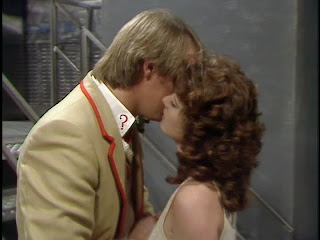Doctor: Peter Davison (5th Doctor)
Companions: Tegan, Turlough, Kamelion
Writtten by: Terence Dudley
Directed by: Tony Virgo
Background & Significance: Now here's an odd one.
"The King's Demons" is one of the few two parters in Classic
Who history, and it's something of a strange thing as a result. For one thing, these two parters are usually a bit of diversionary fun, but often structured strangely.
For one thing, they usually build like the first part of a four parter and then resolve and deal with complications rather quickly. In fact, there's rarely actually any sort of complication to them. They just sorta happen. Like I said, diversionary.
Terence Dudley, if you'll remember, is the fellow who did the script to "
Black Orchid", which was also a two-parter. That, like this, was a bit of diversionary fun, something to intermissioncise the season between two stories--whatever was coming up supposedly being major or whatever. In this case, the plan was for "The King's Demons" to fall between the "massive" Black Guardian Trilogy and Eric Saward's revival of The Daleks in what was supposed to be called "The Return" but which turned into "
Resurrection of the Daleks" a season later when it was postponed from this season (season 20) due to a labour strike (which was becoming far too common, if you ask me).
So it only makes sense that "The King's Demons" come here. I mean, The Daleks were about to come back. And now we're going to give The Doctor a cool, new, in-no-way-like-C-3PO robot companion with which he can use to fight The Daleks? Awesome. I approve.
Oh if only it were that simple.
So yes, this is the beginning of the Kamelion disaster, Kamelion being a robot so awesome
he only made one other appearance in the life of the show. And rightfully so, because he totally was a botched attempt and not wonderfully realized or given that real chance to shine or whatever, but I'm sure I can talk about that as I go through it or something. Especially in part two.
Also fun to point out: it's Season 20! So we get the return of a villain. Last time we talked about this season,
we talked about Omega (which was a genius callback, kids; seriously genius), but now we're at the tail end of the season and we get... Oh. We get The Master, again.
You can feel the wear and tear on the show. Producer Jonathan Nathan Turner's original plan to include The Master at least two times a season was quickly sidelined in favour of other stories that were, quite frankly, better. Also,
the last time The Master showed up it was so super sucky that it makes you want to put a gun in your mouth. This is another almost famously infamous Master-is-totally useless story. Which is weird because if they had just gone straight pseudo-historical with this or maybe had the Monk (there's an idea, Captain Jonathan "Callback" Nathan-Turner) or something this would turn out a bit more interesting, but... alas, I suppose.
So let's get to it!



















































